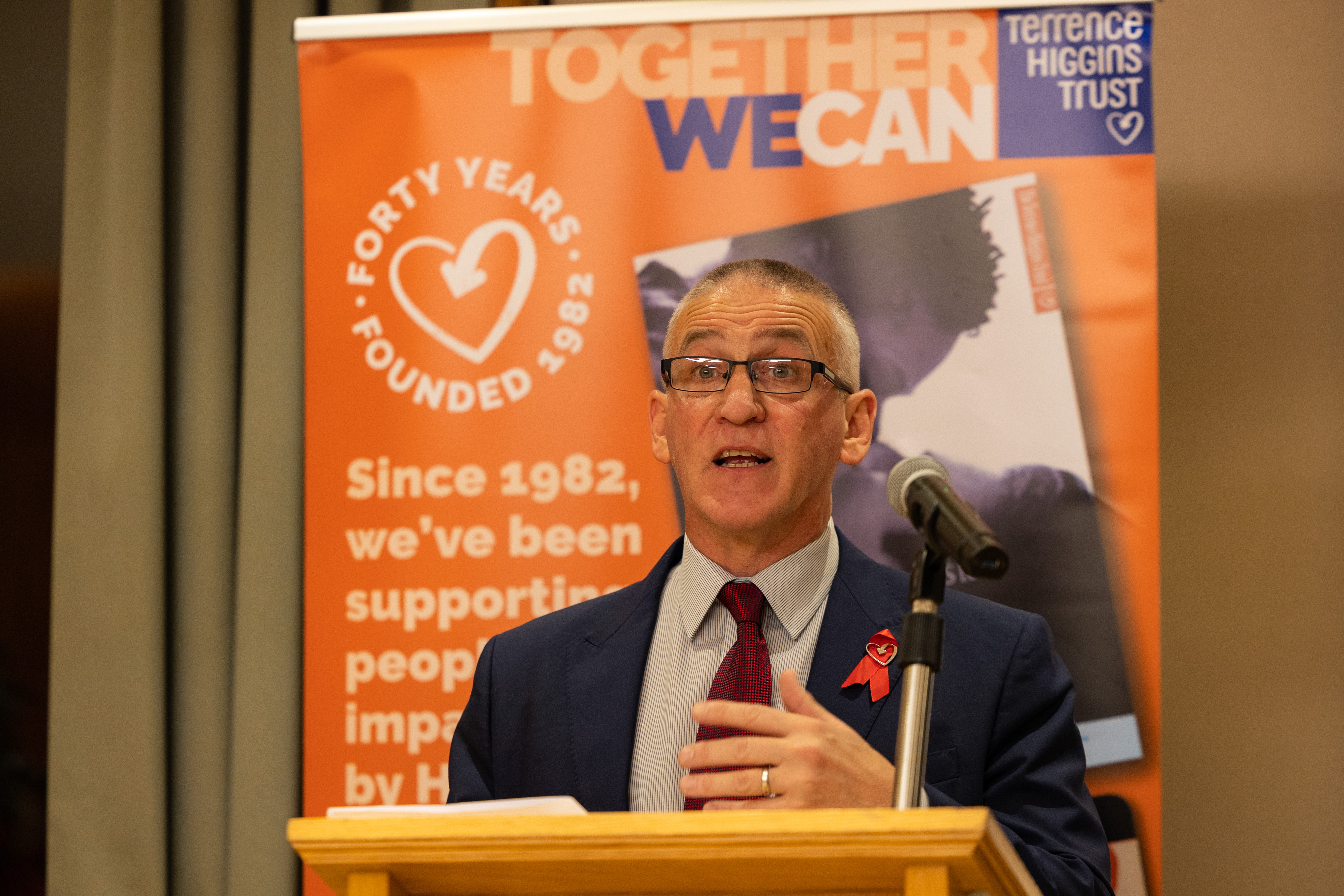
Ian Green addressed parliamentarians, policy makers and people living with HIV last night at Terrence Higgins Trust's World AIDS Day Westminster reception. This is the text of his speech, given at Westminster Council on the evening of 29 November 2022.
Good evening everyone, thank you for being here and to The Lord Mayor of Westminster for donating this spectacular room to us for this event.
We are marking 40 years since Terry Higgins died this year. He is one of so many whose lives were cut short, who we stop to remember on World AIDS Day. It was the people who loved Terry who founded our charity, at a time when there wasn’t even a name for the virus he had, let alone a test or any treatment.
When Terry died, his partner Rupert wasn’t told anything about the cause because their love was not recognised or respected. He had to read about Terry’s case in a medical journal.
That was the context in which Terrence Higgins Trust was founded.
I was diagnosed 15 years later. By then, HIV had a name and we had a test, but that wasn’t much comfort when my clinic told me I had approximately eight more years to live. I was expected to die in my thirties – like Terry did.
What I wasn’t told that day was that clinicians across the UK had just come back from the 1996 AIDS Conference in Vancouver. The theme was ‘One World One Hope’. There had been a breakthrough that year and at the conference - researchers presented on Anti-Retroviral Therapy.
I was diagnosed on the cusp of this change, so although I didn’t know it at the time, I was going to be able to live long beyond my thirties - albeit with the grim side effects of that early triple therapy.
Fast forward another 26 years and from this room, we have an amazing view of one of the first city in the world to reach the UNAIDS 95:95:95 target.
We have a national aspiration to end new HIV cases and an Action Plan in place to drive it forward. As a matter of routine every time someone has their blood taken in emergency departments in London – and in Brighton, central Manchester and Blackpool – they are tested for HIV. And when someone is diagnosed with HIV in London, they can freely access treatment that means they can’t pass on the virus.
There is still a long way to go and wrongs that must be righted. Black Africans and gay and bisexual men have borne a disproportionate burden of HIV. We can be proud that in the latter group there has been remarkable progress, although monkeypox (or mpox) has highlighted how much we still have to fight for equal healthcare for LGBT+ people.
We now have to ensure that everyone benefits from the progress that we know is possible. Still 56% of people from a Black African heritage were diagnosed late last year and there isn’t a local authority in the country where any more than 5 women are accessing PrEP. That’s unacceptable, and we won’t ever reach zero by 2030 if we don’t tackle those inequalities.
There is also still a community of people who are waiting for justice, having been catastrophically let down over decades. Yes there was a breakthrough this year, but the those impacted by contaminated blood – the Macfarlane Community should not be looking to another Christmas, without an apology and without proper compensation for what happened. As Lib has reminded us so powerfully this evening, they deserve the truth, justice and closure.
We have made remarkable steps forward in ways that Terry couldn’t have dreamed of. That’s because of the leadership shown by so many in this room. I have to start my thanks with Deborah Gold and Anne Aslett, who partnered with us on the HIV Commission and so much more and everyone who was involved in setting that blueprint for England to be the first country in the world to get to zero.
There are politicians who have met us on the other side of the table. Matt Hancock made the commitment to end new transmissions in 2019. Sajid Javid tore up the blood donation rules and found us £20 million for opt-out testing. Boris Johnson provided the first compensation payment for some of the Macfarlane Community.
In the opposition, Keir Starmer has made sure Labour is also committed to the 2030 goal. Wes Streeting put his name to the recommendations of the HIV Commission – I think blissfully unaware that he was committing his future self as Shadow Health Secretary to all those policies – and has continued to be a champion for us in that role.
And we now have the first Prime Minister who committed to ending new HIV transmissions before he took office and reiterated it as part of his leadership campaign.
This is my last World AIDS Day as Chief Executive of Terrence Higgins Trust. I am one of the thousands of people who have benefitted from Terry’s legacy and this great organisation, which is why I am so proud to have carried the torch for the last seven years.
What excites me is that I can leave in the new year knowing that our shared ambitions are in safe hands with you all. It won’t be easy and it’s definitely not inevitable, but I have hope that we will all be able to come back together in eight years and celebrate that we were the generation who ended new HIV transmissions in this country. Imagine how good it will feel if we are the first. It’s in your hands now. Thank you.



